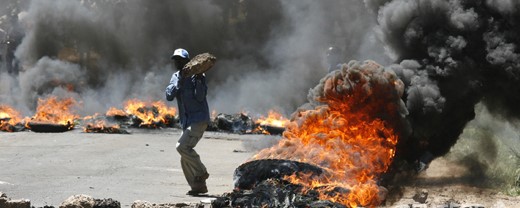By Nelly Warega
For countries that have experienced conflict and massive human rights violations such as Kenya, a credible transitional justice process is the best way to deliver accountability. This means that truth seeking and reconciliation processes, such as those attempted in the country between 2008 and 2011, need to be carried out alongside other initiatives such as criminal prosecutions, reparations and institutional and legal reforms to avoid the recurrence of violence. Kenya’s post-2007 election violence claimed the lives of over 1,000 people and displaced more than 500,000. The lack of political will to investigate and prosecute murder, police shootings, rape and other forms of sexual violence, forcible displacement and torture committed in this period resulted in the International Criminal Court (ICC) intervening to charge those perceived as having the greatest responsibility for crimes that had been committed.
Further investigations into the crimes allegedly committed by the six suspects indicted by ICC Chief Prosecutor Luis Moreno Ocampo were hampered by lack of political will and State failure to cooperate with the court. The State refused or failed to honour requests for production of records from the prosecution team in the case against Uhuru Kenyatta, who would subsequently be elected President. Further, incidences of witness tampering were recorded while several witnesses chose to withdraw or recant their testimony. Others witnesses disappeared or were found murdered in inexplicable circumstances. It is this systematic deterioration of evidence that forced the prosecutor to withdraw charges against Francis Muthaura and Kenyatta, while the Pre-Trial Chamber terminated the charges against Deputy Prosecutor William Ruto and co-accused Joshua arap Sang citing similar reasons.
Despite the collapse of the ICC cases, domestic efforts to hold the government of Kenya to account for the crimes committed in 2007 are still on-going. The case filed by 13 victims of police shootings in Kisumu during the post-election violence period is one such example. The petition seeks to bring police officers who, through illegal use of firearms, caused harm and suffering on the victims. Also named as respondents in the case are the Inspector General of Police whose mandate is to investigate allegations of criminal conduct, the Director of Public Prosecutions (DPP) whose mandate is to institute criminal proceedings, and the Independent Policing Oversight Authority (IPOA) tasked with the investigation of police conduct.
The March 5 court session heard the testimonies of four witnesses, three of whom are direct victims of police shootings. Of the three, two suffered direct harm. One was shot on the back of his leg, forcing doctors to amputate it, while the other was shot in the jaw on her way home from work one evening during the violence period. The third witness spoke about his daughter, who was shot and succumbed to a police bullet that hit her while in her home.
The fourth witness was Samwel Mohochi, former Executive Director of Independent Medico-Legal Unit (IMLU), a co-petitioner in the case. He presented a report compiled by IMLU which documented up to 80 deaths resulting from police shootings. The State maintains that contents of the report cannot be verified and IPOA argues that since the report did not have names and contacts of the victims, it is impossible for any authority to conduct investigations. It is an unwarranted claim since IPOA has never reached out to IMLU for these same records.
The petition, which is likely to be concluded this year, will be expedited for two reasons. One, Judge Fred Ochieng asked the petitioners to select only three victims from among the 15 witnesses to testify in court. While this decision is welcome, it should not be made at the expense of the victims. Presenting testimonies in court is an important part of truth telling and healing for victims of any crime. Courts must be careful to ensure that in speeding up the wheels of justice, they do not mute the voices of those who seek justice. The second reason the case will be concluded quickly is the confirmation by the respondents that they would not call any witnesses and so the case now moves to the submissions stage. It is important to note that although the case was filed in 2013, it took the state four years to file its responses, causing delays and further harm to the victims. The conclusion of the case will bring a much-awaited reprieve for the petitioners in this case who were subjected to a five-year wait before the matter could be heard.
Two other cases filed by victims of sexual and gender-based violence victims as well as internally displaced persons are also still pending at the High Court in Nairobi years after they were filed. These cases represent a bigger constituency of victims who cling to the hope that one day their voices will be heard and suffering alleviated.
If the conduct of the State as observed over the years, is anything to go by, through its interaction with the ICC, its denial of liability and subsequent lack of support for domestic prosecutions — including civil liability cases — victims in Kenya may be knocking the doors of justice for a long time.
Still, the questions that continue to beg answers are whether justice has a different hue when it arrives many years after the violations. How long must victims wait for the State to acknowledge their suffering and take responsibility for its failure to protect its citizens? Must victims wait for successful determination of court cases to receive reparations from the State?
Nelly Warega is an Advocate of the High Court of Kenya and Programme Officer, International Justice Programme at ICJ Kenya







